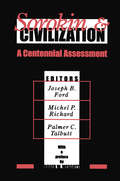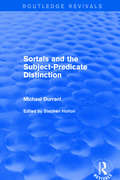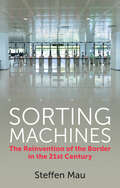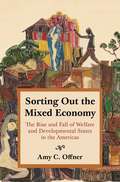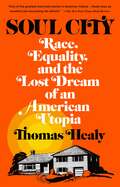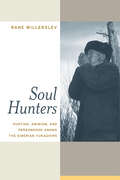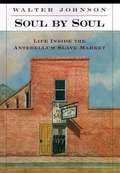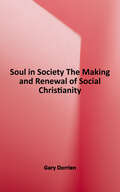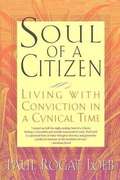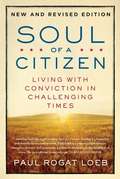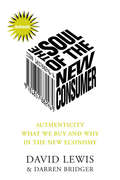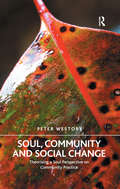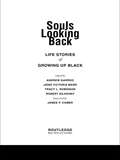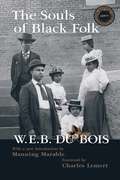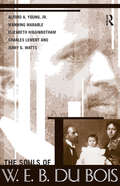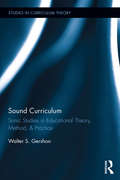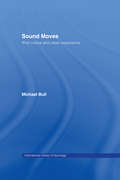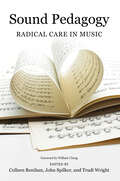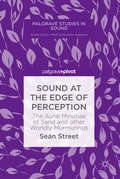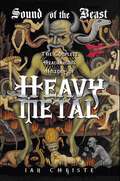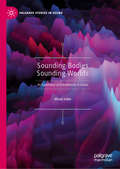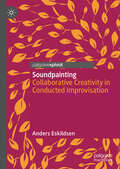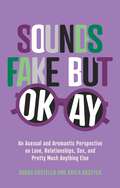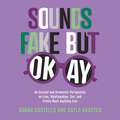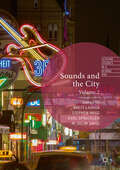- Table View
- List View
Sorokin and Civilization: A Centennial Assessment
by Joseph B. FordSorokin and Civilization is a festschrift to Pitirim Sorokin, one of the most famed figures of twentieth-century sociology and first president of the International Society for the Comparative Study of Civilizations (ISCSC). He was a giant of the twentieth-century stage in the larger world as well. He debated with Trotsky, exchanged ideas with Pavlov, and received a personal invitation to meet with President Masaryk of Czechoslovakia. His principled dissent from sociological orthodoxy frequently anticipated that of Charles Wright Mills, Alfred McClung Lee, and Alexander Solzhenitsyn. He was, to paraphrase Joseph Ford, a scholar among statesmen and a statesman among scholars.The volume is divided into four parts: "A Life Remembered"; "Sorokin as Gadfly"; "Sorokin's Methodology"; and, "Applying Sorokin's Theories." Contributors and chapters to this volume include: "Sorokin's Life and Work" by Barry V. Johnston; "The Sorokin-Merton Correspondence on Puritanism, Pietism, and Science" by Robert K. Merton; "Sorokin and American Sociology: The Dynamics of a Moral Career in Science" by Lawrence T. Nichols; "Sorokin as Dialectician" by Robert C. Hanson; "Applying Sorokin's Typology" by Michel P. Richard; and "Transitions, Revolutions, and Wars" by William Eckhardt. Sorokin and Civilization will appeal to all those with an interest in cultural and historical processes and the life and theories of Sorokin.
Sortals and the Subject-predicate Distinction (2001)
by Michael DurrantThis title was first published in 2001. The problem of the subject-predicate distinction has featured centrally in much of modern philosophy of language and philosophical logic, and the distinction is taken as basic or fundamental in modern philosophical logic. Michael Durrant seeks to demonstrate that the distinction should not be taken as basic or fundamental and argues that the reason for it being held to be fundamental is a failure to acknowledge the category and role of the sortal. A sortal is a symbol which furnishes us with a principle for distinguishing and counting particulars (objects) and whick does so in its own right relying on no antecedent principle or method of so distinguishing or counting. This book explores sortals and their relationship to the subject-predicate distinction; arguing that the nature of sortal symbols has been misconstrued in much modern writing in the philosophy of logic by failing to distinguish sortals from names and predicates.
Sorting Machines: The Reinvention of the Border in the 21st Century
by Steffen MauIt is commonly thought that, thanks to globalization, nation-state borders are becoming increasingly porous. Steffen Mau shows that this view is misleading: borders are not getting more permeable today, but rather are being turned into powerful sorting machines. Supported by digitalization, they have been upgraded to smart borders, and border control has expanded spatially on a massive scale. Mau shows how the new sorting machines create mobility and immobility at the same time: for some travellers, borders open readily, but for others they are closed more firmly than ever. While a small circle of privileged people can travel almost anywhere today, the vast majority of the world’s population continues to be systematically excluded. Nowhere is the Janus nature of globalization more evident than at the borders of the 21st century.
Sorting Out the Mixed Economy: The Rise and Fall of Welfare and Developmental States in the Americas (Histories of Economic Life #16)
by Professor Amy C. OffnerThe untold story of how U.S. development efforts in postwar Latin America helped lead to the dismantling of the U.S. welfare stateIn the years after 1945, a flood of U.S. advisors swept into Latin America with dreams of building a new economic order and lifting the Third World out of poverty. These businessmen, economists, community workers, and architects went south with the gospel of the New Deal on their lips, but Latin American realities soon revealed unexpected possibilities within the New Deal itself. In Colombia, Latin Americans and U.S. advisors ended up decentralizing the state, privatizing public functions, and launching austere social welfare programs. By the 1960s, they had remade the country’s housing projects, river valleys, and universities. They had also generated new lessons for the United States itself. When the Johnson administration launched the War on Poverty, U.S. social movements, business associations, and government agencies all promised to repatriate the lessons of development, and they did so by multiplying the uses of austerity and for-profit contracting within their own welfare state. A decade later, ascendant right-wing movements seeking to dismantle the midcentury state did not need to reach for entirely new ideas: they redeployed policies already at hand.In this groundbreaking book, Amy Offner brings readers to Colombia and back, showing the entanglement of American societies and the contradictory promises of midcentury statebuilding. The untold story of how the road from the New Deal to the Great Society ran through Latin America, Sorting Out the Mixed Economy also offers a surprising new account of the origins of neoliberalism.
Soul City: Race, Equality, and the Lost Dream of an American Utopia
by Thomas HealyA New York Times Book Review Editors’ ChoiceThe fascinating, forgotten story of the 1970s attempt to build a city dedicated to racial equality in the heart of “Klan Country”In 1969, with America’s cities in turmoil and racial tensions high, civil rights leader Floyd McKissick announced an audacious plan: he would build a new city in rural North Carolina, open to all but intended primarily to benefit Black people. Named Soul City, the community secured funding from the Nixon administration, planning help from Harvard and the University of North Carolina, and endorsements from the New York Times and the Today show. Before long, the brand-new settlement – built on a former slave plantation – had roads, houses, a health care center, and an industrial plant. By the year 2000, projections said, Soul City would have fifty thousand residents.But the utopian vision was not to be. The race-baiting Jesse Helms, newly elected as senator from North Carolina, swore to stop government spending on the project. Meanwhile, the liberal Raleigh News & Observer mistakenly claimed fraud and corruption in the construction effort. Battered from the left and the right, Soul City was shut down after just a decade. Today, it is a ghost town – and its industrial plant, erected to promote Black economic freedom, has been converted into a prison.In a gripping, poignant narrative, acclaimed author Thomas Healy resurrects this forgotten saga of race, capitalism, and the struggle for equality. Was it an impossible dream from the beginning? Or a brilliant idea thwarted by prejudice and ignorance? And how might America be different today if Soul City had been allowed to succeed?
Soul Hunters: Hunting Animism and Personhood among the Siberian Yukaghirs
by Rane WillerslevThis is an insightful, highly original ethnographic interpretation of the hunting life of the Yukaghirs, a little-known group of indigenous people in the Upper Kolyma region of northeastern Siberia. Basing his study on firsthand experience with Yukaghir hunters, Rane Willerslev focuses on the practical implications of living in a "hall-of-mirrors" world—one inhabited by humans, animals, and spirits, all of whom are understood to be endless mimetic doubles of one another. In this world human beings inhabit a betwixt-and-between state in which their souls are both substance and nonsubstance, both body and soul, both their own individual selves and reincarnated others. Hunters are thus both human and the animals they imitate, which forces them to steer a complicated course between the ability to transcend difference and the necessity of maintaining identity.
Soul by Soul: Life Inside the Antebellum Slave Market
by Walter JohnsonSoul by Soul tells the story of slavery in antebellum America by moving away from the cotton plantations and into the slave market itself, the heart of the domestic slave trade. Taking us inside the New Orleans slave market, the largest in the nation, where 100,000 men, women, and children were packaged, priced, and sold, Walter Johnson transforms the statistics of this chilling trade into the human drama of traders, buyers, and slaves, negotiating sales that would alter the life of each. What emerges is not only the brutal economics of trading but the vast and surprising interdependencies among the actors involved. Using recently discovered court records, slaveholders' letters, nineteenth-century narratives of former slaves, and the financial documentation of the trade itself, Johnson reveals the tenuous shifts of power that occurred in the market's slave coffles and showrooms. Traders packaged their slaves by "feeding them up," dressing them well, and oiling their bodies, but they ultimately relied on the slaves to play their part as valuable commodities. Slave buyers stripped the slaves and questioned their pasts, seeking more honest answers than they could get from the traders. In turn, these examinations provided information that the slaves could utilize, sometimes even shaping a sale to their own advantage. Johnson depicts the subtle interrelation of capitalism, paternalism, class consciousness, racism, and resistance in the slave market, to help us understand the centrality of the "peculiar institution" in the lives of slaves and slaveholders alike. His pioneering history is in no small measure the story of antebellum slavery.
Soul in Society: The Making and Renewal of Social Christianity
by Gary DorrienGary Dorrien's major work addresses the roots of and remedy to the current crisis in American Christian social ethics. Focusing on the story of American liberal Protestantism, the book examines in fascinating depth the three major movements in this century - the Social Gospel, Christian Realism, and Liberation Theology - in a way that also brings African-American, feminist, environmentalist, Catholic, and other voices into the increasingly multicultural quest. Dorrien then carefully assesses the crisis of social Christian thought in a culture that is increasingly secular, materialistic, and dominated by capitalism. He shows how the progressive Christian vision of social and economic democracy can be redeemed in the face of its apparent defeat. He argues strongly for a social Christianity faithful to the spiritual reality and kingdom-oriented ethic of the way of Christ. Dorrien's engaging narrative, knowledgeable and fair analysis, and thoughtful proposal bring desperately needed clarity and commitment to the Christian social conscience.
Soul of a Citizen: Living with Conviction in Challenging Times, Revised and Updated Edition
by Paul Rogat LoebSoul of a Citizen awakens within us the desire and the ability to make our voices heard and our actions count. We can lead lives worthy of our convictions. A book of inspiration and integrity, Soul of a Citizen is an antidote to the twin scourges of modern life--powerlessness and cynicism. In his evocative style, Paul Loeb tells moving stories of ordinary Americans who have found unexpected fulfillment in social involvement. Through their example and Loeb's own wise and powerful lessons, we are compelled to move from passivity to participation. The reward of our action, we learn, is nothing less than a sense of connection and purpose not found in a purely personal life. Soul of a Citizen has become the handbook for budding social activists, veteran organizers, and anybody who wants to make a change―big or small―in the world around them. At this critical historical time , Paul Loeb's completely revised edition―and inspiring message―is more urgently important than ever.
Soul of the New Consumer: Authenticity - What We Buy and Why in the New Economy
by David Lewis Darren BridgerThe New Consumer's Revolution: * Why buzz beats hype * Why cheap is chic * Why brands must be authentic * Why segmentation is dead * Why advertising must reinvent itself * Why New Consumers loathe 'doing the shopping' * Why individuals' Tastespace will triumph in the marketplace New Consumers are revolutionizing the world of business, our culture and social expectations. No longer confined by gender, age, ethnicity or income, they are breaking down barriers, shattering stereotypes and redefining the very meaning of consumerism and the marketplace. From traditional to online retailing, from tracking coolhunters to exploring tastepace, The Soul of the New Consumer unearths the very essence of New Consumer's behavior - their drive for authenticity - and goes far beyond the simple concepts of how we shop or what we buy to answer the most important question of all: why. Every facet of the new economy, from buzz marketing and new retailing technologies to internet shopping, has dramatically altered not only how we buy but what we buy and why. In an era of 'cheap is chic', wealthy shoppers haggle to win even the smallest discounts ; gray consumers buy more rap and techno music than anyone else and are the fastest growing group of internet users ; and the Web and the power of micro-marketing have revolutionized forever the means of wooing new customers. New Consumers are taking over the world and redefining the very meaning of consumerism and the marketplace. As likely to be affluent over-fifties as ambitious under-thirties, New Consumers defy traditional marketing concepts and segmentation by age, gender or income. In pursuit of the authentic experience, New Consumers come together in their defining drive for all things 'real', in everything from food to fashion, foreign holidays to furniture, technology to spirituality. Their attention and interest have shifted from commodity to authenticity. In an affluent world now saturated with affordable products there are three new scarcities - time, attention and trust. This major book shows how these can be won by 'giving the soul control' rather than putting customers on the 'customer is king' pedestal. Over the past decade, Lewis and Bridger have been at the forefront of researching the New Consumers - studying their lifestyles, observing behavior and watching the steady rise in their numbers, influence and economic power. Here, for the first time and with example from Starbucks to Dyson, they report the results of their work, including Amex's use of computer technology to create intimate protraits of individuals - what the author's call 'tastepace'.
Soul, Community and Social Change: Theorising a Soul Perspective on Community Practice
by Peter WestobyAt a time when inequalities are growing globally, when the pace of socio-economic transitions is rapid, and when traditional ties of community are under threat of dissolving, 'soul' offers a new way of thinking imaginatively about how people might respond both individually and collectively in social change work. In exploring ideas such as soul, soulful, 'soul of the world' and soul-force, Peter Westoby invites readers to disrupt their taken-for-granted assumptions about community practice and to foreground ethics, quality, being and the aesthetic. Drawing on work of people such as James Hillman, Thomas Moore and 'Bifo' Beradi, he insists on the need to bring more depth into practice, eschewing contemporary trends of soulless analysis, measuring, and technique. Written in dialogue with eight practitioner-scholars from around the world, the book suggests a fresh terrain for community work and social change theorising. Illustrated by images of Australian cartoonist-prophet Michael Leunig, the book also promises to unlock new imaginative spaces for dreaming. A soul perspective will resonate with people searching for both a robust socio-political response to the world and an imaginative, poetic and mindful centring of self, 'other' and the planet to their practice.
Souls Looking Back: Life Stories of Growing Up Black
by Andrew Garrod Robert Kilkenny James P. Comer Janie Victoria Ward Tracy L. RobinsonFirst published in 1999. Routledge is an imprint of Taylor & Francis, an informa company.
Souls of Black Folk
by Manning Marable W. E. Du BoisThis 100th Anniversary edition of Du Bois's most widely read book offers significant updates and advantages over all other editions of this classic of African American history. A new Introduction by Manning Marable, Du Bois biographer and eminent historian, puts The Souls of Black Folk into context for 21st Century readers and recounts Du Bois's life-long relationship with his text, which Du Bois continued to rework over many decades. A rarely seen 1953 Re-Introduction by Du Bois is included in this edition, as are the many corrections and changes Du Bois made to the original text during this era. Finally, an explication of the Du Bois text in the new Foreword by Charles Lemert helps the reader better understand the book's historical and current relevance, as does the afterword by Cheryl Townsend Gilkes reflecting on Du Bois's influence on feminism.
Souls of W.E.B. Du Bois
by Manning Marable Charles C. Lemert Elizabeth Higginbotham Jerry Gafio Watts Alford A. YoungThis work marks the recent passing of the 100th Anniversary of Du Bois' classic of African American literature. More than fifty events and celebrations were held in cities and universities around the country. It poignantly explores the relationship of Du Bois, the man, to his writings. It is written by expert team of authors including the prominent Manning Marable. "The Souls of W. E. B. Du Bois" explores the relationship of W. E. B. Du Bois' seminal book, "The Souls of Black Folk", to other works in his scholarly portfolio and to his larger project concerning race, racial identity, and the social objectives of scholarly engagement. Prominent authors consider why the classic book remains so relevant today.
Sound Curriculum: Sonic Studies in Educational Theory, Method, & Practice (Studies in Curriculum Theory Series)
by Walter S. GershonPart of a growing group of works that addresses the burgeoning field of sound studies, this book attends not only to theoretical and empirical examinations, but also to methodological and philosophical considerations at the intersection of sound and education. Gershon theoretically advances the rapidly expanding field of sound studies and simultaneously deepens conceptualizations and educational understandings across the fields of curriculum studies and foundations of education. A feature of this work is the novel use of audio files aligned with the arguments within the book as well as the discussion and application of cutting-edge qualitative research methods.
Sound Moves: iPod Culture and Urban Experience (International Library of Sociology)
by Michael BullThis innovative study opens up a new area in sociological and urban studies: the aural experience of the social, mediated through mobile technologies of communication. Whilst we live in a world dominated by visual epistemologies of urban experience, Michael Bull argues that it is not surprising that the Apple iPod, a sound based technology, is the first consumer cultural icon of the twenty-first century. This book, in using the example of the Apple iPod, investigates the way in which we use sound to construct key areas of our daily lives. The author argues that the Apple iPod acts as an urban Sherpa for many of its users and in doing so joins the mobile army of technologies that many of us habitually use to accompany our daily lives. Through our use of such mobile and largely sound based devices, the book demonstrates how and why the spaces of the city are being transformed right in front of our ears.
Sound Pedagogy: Radical Care in Music (Music in American Life)
by Mark Katz Stephanie Jensen-Moulton Mary Natvig Sara Haefeli William Everett Colleen Renihan Molly M Breckling Kate Galloway Eric Hung Nathan A Langfitt Matteo Magarotto Frederick A Peterbark Laura Moore Pruett Amanda Christina Soto John Spilker Reba A Wissner Trudi WrightMusic education today requires an approach rooted in care and kindness that coexists alongside the dismantling of systems that fail to serve our communities in higher education. But, as the essayists in Sound Pedagogy show, the structural aspects of music study in higher education present obstacles to caring and kindness like the entrenched master-student model, a neoliberal individualist and competitive mindset, and classical music’s white patriarchal roots. The editors of this volume curate essays that use a broad definition of care pedagogy, one informed by interdisciplinary scholarship and aimed at providing practical strategies for bringing transformative learning and engaged pedagogies to music classrooms. The contributors draw from personal experience to address issues including radical kindness through universal design; listening to non-human musicality; public musicology as a forum for social justice discourse; and radical approaches to teaching about race through music. Contributors: Molly M. Breckling, William A. Everett, Kate Galloway, Sara Haefeli, Eric Hung, Stephanie Jensen-Moulton, Mark Katz, Nathan A. Langfitt, Matteo Magarotto, Mary Natvig, Frederick A. Peterbark, Laura Moore Pruett, Colleen Renihan, Amanda Christina Soto, John Spilker, Reba A. Wissner, and Trudi Wright
Sound at the Edge of Perception: The Aural Minutiae of Sand and other Worldly Murmurings (Palgrave Studies in Sound)
by Seán StreetThis book is about the tiny sounds of the world, and listening to them, the minute signals that are clues to who and where we are. A very small sound, given the context of its history, becomes hugely significant, and even an imagined sound in a picture becomes almost a voice. By speaking a name, we give a person back to the world, and a breath, a sigh, a laugh or a cry need no language. A phoneme is the start of all stories, and were we able to tune ourselves to the subtleties of the natural world, we might share the super-sensitivity of members of the bird and animal kingdom to sense the message in the apparent silence. Mind hears sound when it perceives an image; the book will appeal to sonic and radio practitioners, students of sound, those working in the visual arts, and creative writers.
Sound of the Beast: The Complete Headbanging History of Heavy Metal
by Ian ChristeThe definitive history of the first 30 years of heavy metal, containing over 100 interviews with members of Black Sabbath, Metallica, Judas Priest, Twisted Sister, Slipknot, Kiss, Megadeth, Public Enemy, Napalm Death, and more. More than 30 years after Black Sabbath released the first complete heavy metal album, its founder, Ozzy Osbourne, is the star of The Osbournes, TV's favourite new reality show. Contrary to popular belief, headbangers and the music they love are more alive than ever. Yet there has never been a comprehensive book on the history of heavy metal - until now. Featuring interviews with members of the biggest bands in the genre, Sound of the Beast gives an overview of the past 30-plus years of heavy metal, delving into the personalities of those who created it. Everything is here, from the bootlegging beginnings of fans like Lars Ulrich (future founder of Metallica) to the sold-out stadiums and personal excesses of the biggest groups. From heavy metal's roots in the work of breakthrough groups such as Black Sabbath and Led Zeppelin to MTV hair metal, courtroom controversies, black metal murderers and Ozzfest, Sound of the Beast offers the final word on this elusive, extreme, and far-reaching form of music.
Sounding Bodies Sounding Worlds: An Exploration of Embodiments in Sound (Palgrave Studies in Sound)
by Mickey ValleeWhat makes a body of sound appear as an aesthetic object as well as a method for knowledge? In Sounding Bodies Sounding Worlds, Mickey Vallee argues that we must impose our sonic imagination onto the non-sonic, and embrace how we sound to ourselves, sound with our animal companions, and sound in very earth itself. From the invention of the laryngoscope to the role of the spectrogram, from the call of the bird to the tumble of a rockslide, from the deep listening of environmental immersion to the computational listening of bioacoustics research, Vallee offers a wide range of cases to convincingly argue that all life shares in a continuous, embodied and ethical vibration.
Soundpainting: Collaborative Creativity in Conducted Improvisation (Palgrave Studies in Sound)
by Anders EskildsenThis book explores Soundpainting, a multidisciplinary sign language for live composition and conducted improvisation, highlighting its role in facilitating creative, social interactions in music and other performative arts. Examining the meaning of Soundpainting’s syntax, the connection between constraints and creativity in hand signs, and the means for dynamic distribution and transformation of agency within ensembles, the book provides insight into the nature of cocreation and the organization of creative processes.
Sounds Fake But Okay: An Asexual and Aromantic Perspective on Love, Relationships, Sex, and Pretty Much Anything Else
by Sarah Costello Kayla Kaszyca'Somehow, over time, we forgot that the rituals behind dating and sex were constructs made up by human beings and eventually, they became hard and fast rules that society imposed on us all.'True Love. Third Wheels. Dick pics. 'Dying alone'. Who decided this was normal?Sarah and Kayla invite you to put on your purple aspec glasses - and rethink everything you thought you knew about society, friendship, sex, romance and more.Drawing on their personal stories, and those of aspec friends all over the world, prepare to explore your microlabels, investigate different models of partnership, delve into the intersection of gender norms and compulsory sexuality and reconsider the meaning of sex - when allosexual attraction is out of the equation.Spanning the whole range of relationships we have in our lives - to family, friends, lovers, society, our gender, and ourselves, this book asks you to let your imagination roam, and think again what human connection really is. Includes exclusive 'Sounds Fake But Okay' podcast episodes.
Sounds Fake But Okay: An Asexual and Aromantic Perspective on Love, Relationships, Sex, and Pretty Much Anything Else
by Sarah Costello Kayla Kaszyca'Somehow, over time, we forgot that the rituals behind dating and sex were constructs made up by human beings and eventually, they became hard and fast rules that society imposed on us all.'An empowering guide to help aspec people become more confident in their identities and understand their relationships, written by the hosts of the #1 podcast on asexuality.True Love. Third Wheels. Dick pics. 'Dying alone'. Who decided this was normal?Sarah and Kayla invite you to put on your purple aspec glasses - and rethink everything you thought you knew about society, friendship, sex, romance and more.Drawing on their personal stories, and those of aspec friends all over the world, prepare to explore your microlabels, investigate different models of partnership, delve into the intersection of gender norms and compulsory sexuality and reconsider the meaning of sex - when allosexual attraction is out of the equation.Spanning the whole range of relationships we have in our lives - to family, friends, lovers, society, our gender, and ourselves, this book asks you to let your imagination roam, and think again what human connection really is. Includes exclusive 'Sounds Fake But Okay' podcast episodes.(P)2023 Hodder & Stoughton Limited
Sounds and the City: Volume 2 (Leisure Studies in a Global Era)
by Stephen Wagg Karl Spracklen Brett Lashua M. Selim YavuzThis book draws from a rich history of scholarship about the relations between music and cities, and the global flows between music and urban experience. The contributions in this collection comment on the global city as a nexus of moving people, changing places, and shifting social relations, asking what popular music can tell us about cities, and vice versa. Since the publication of the first Sounds and the City volume, various movements, changes and shifts have amplified debates about globalization. From the waves of people migrating to Europe from the Syrian civil war and other conflict zones, to the 2016 “Brexit” vote to leave the European Union and American presidential election of Donald Trump. These, and other events, appear to have exposed an anti-globalist retreat toward isolationism and a backlash against multiculturalism that has been termed “post-globalization.” Amidst this, what of popular music? Does music offer renewed spaces and avenues for public protest, for collective action and resistance? What can the diverse histories, hybridities, and legacies of popular music tell us about the ever-changing relations of people and cities?
